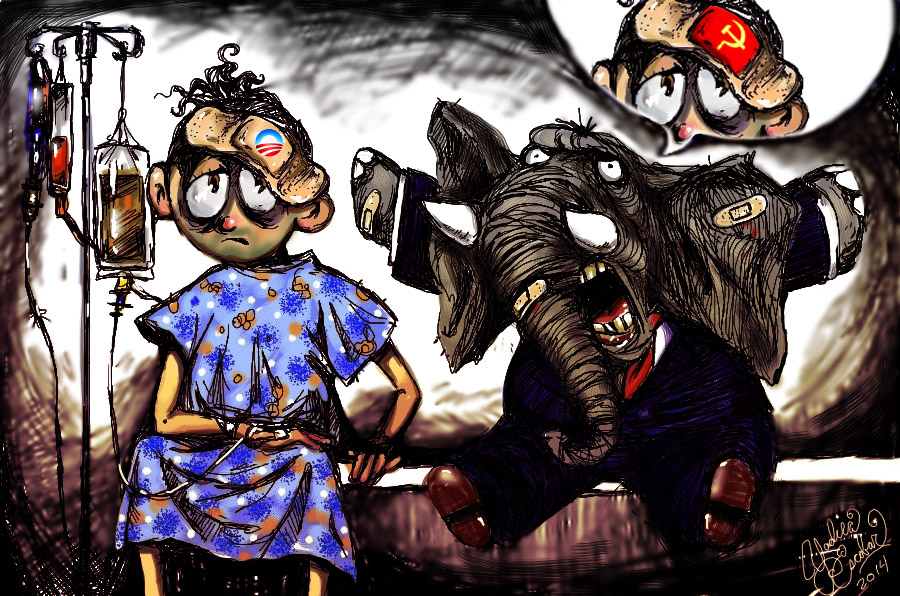
Obamacare
MIAMI — For a long time, Obamacare was not only something radically daring and novel. It was also a very complex concept to understand.
There was much confusion, doubts and fears. In fact, many confused persons assumed that the Patient Protection and Affordable Care Act (PPACA) was another program, whereas it is just another name for Obamacare. Nonprofit local organizations at neighborhood level did not register clients for months but congregated several times to first explain to the volunteers how the program functioned.
The United States is the only First World country that has no universal medical care for its citizens, although it spends 27 percent of its budget on health care. Just so you can have an approximate idea, this year the U.S. defense expenditure will consume 22 percent of the budget.
Because one of the main functions of Obamacare is to help people to secure insurance by extending Medicaid and Medicare, in addition to offering aid to Americans who can’t afford health services, we can say that it has been a popular program. But not everything has been rosy.
The system’s official Internet site, which cost the government more than $1 billion, shamefully broke down because of the massive attempts of applicants to register. The media and the social networks mocked it and made a lot of jokes, and many people complained that the website had been entrusted to an unreliable company out of favoritism.
In South Florida, many applicants overcame the obstacles and managed to enroll in the public health program but, because most of us — those who have not entered a clinic in years for a simple health check — didn’t climb aboard, the emphasis was placed on fines as punishment.
According to the campaign, we all had to be registered in the program so it could function best. Apparently, the years of self-medication with medicine bought in Canada via the Internet or bought in Mexico or suffering through an infected tooth that cost a fortune to treat were over.
Supposedly, those alarming stories about victims of some accident or illness using up their savings or losing their houses or falling deep in debt will be anecdotes from a savage past if Obamacare is successful. I say “savage” because if we compare ourselves with other countries that do have medical care for everyone we seem like a country back in the Stone Age. Yet, very close to us we find Cuba, a disturbing model that — with a lot fewer resources — offers universal coverage.
Half the world’s population knows that the United States is mired in debt, so much of the shine of our market economy could be totally deceiving because it would be based on massive credit.
Although much is said about the costs of the military, with their million-dollar planes that have never been used, the truth is that public health is the most expensive part of the budget at a time when 44 million Americans don’t have the resources to afford medical insurance. At this time of national indebtedness, what’s needed is a serious reform that halts that enormous imbalance, because at the end everything could collapse.
Some have already lost their previous insurance plans and will have to pay a little more every month, out of their personal savings. The immediate benefit of that small increase (which obviously their income permits them to afford) is access to treatment or medicines for which, under other circumstances, they would have to pay huge portions of the total cost.
In summary, any increase in prices will affect only the most affluent participants. The load on the poor will be greatly relieved by enormous state subsidies.
In 2010, the country spent $2.6 trillion in health care, but, according to several studies, more than half of that money (about $1.2 trillion) was spent on bureaucracy, waste and corruption. For years, residents of Dade County have been witnesses to a total violation of federal laws. Fraud involving the Medicare and Medicaid programs are legendary, continuous and brazen, due to the arrogant idea that all laws can be broken in Miami.
The official website of Interpol lists Cubans who have repeatedly violated the law and the most frequent violation is public-health fraud. The son of the late Huber Matos, creator of the CID movement, some years ago fled to Costa Rica after committing Medicare and Medicaid fraud, stealing, along with other people, some $5 million from the federal government.
It is obvious that the health system in the U.S. needed — and still needs — serious reform.
It is odd to hear the reactionary complaints of some Cubans in South Florida who demand privatized medicine for Cuba.
The primary reasons why they accuse Cuban public health care of being inefficient (to use a more decent word) are the esthetic conditions of hospitals. They also claim that patients have to “bribe” doctors with a bunch of bananas or a bottle of oil in order to get better service. The truth is that, in relation to the size of the Cuban economy, Cuba’s public health care is a model for the entire region.
Some aspects of the poor conditions in some hospitals on the island may seem distressing to tourists who come from opulent societies, but don’t many Miami Cubans who can’t afford their treatments here take advantage of the facilities in Cuba? In their desperation, they return to the island, pass themselves off as local residents and take care of their health problems.
Obamacare is a good remedy for a society with the ailments and inequalities typical of the capitalist system, but Cuba overcame the public health problem decades ago with a lot fewer resources. That’s one of the achievements that should never be subordinated to any economic reform of the Cuban system.


